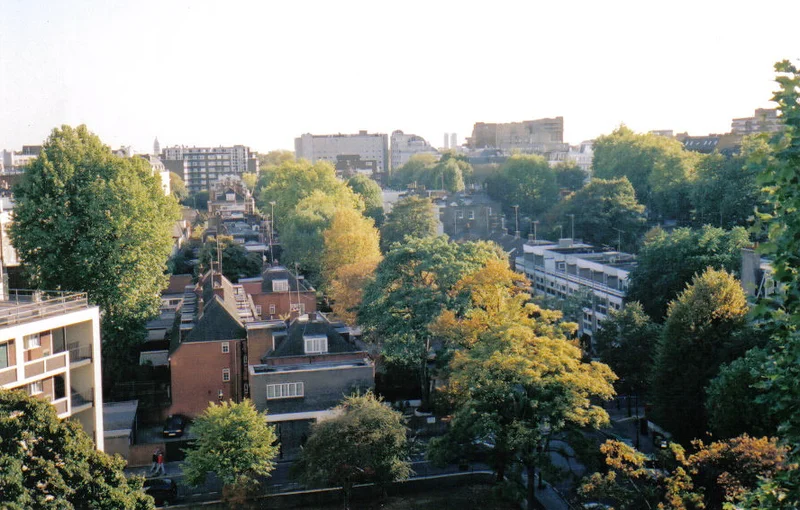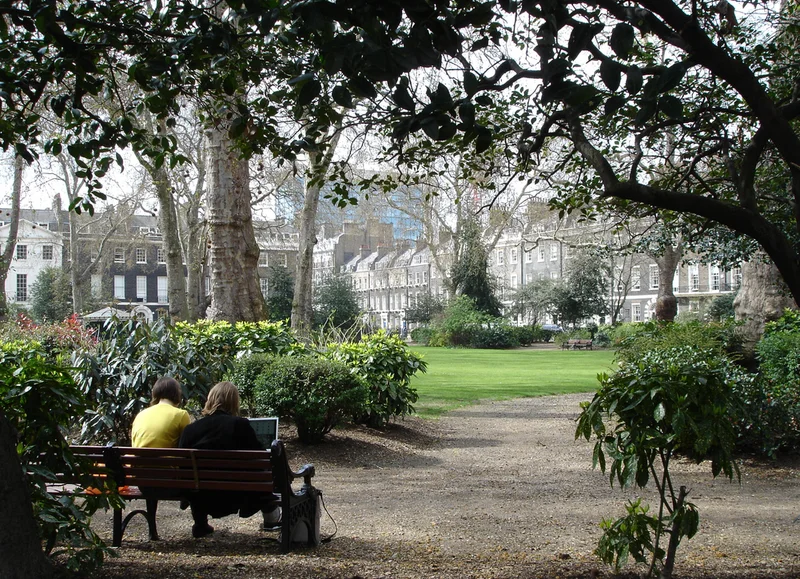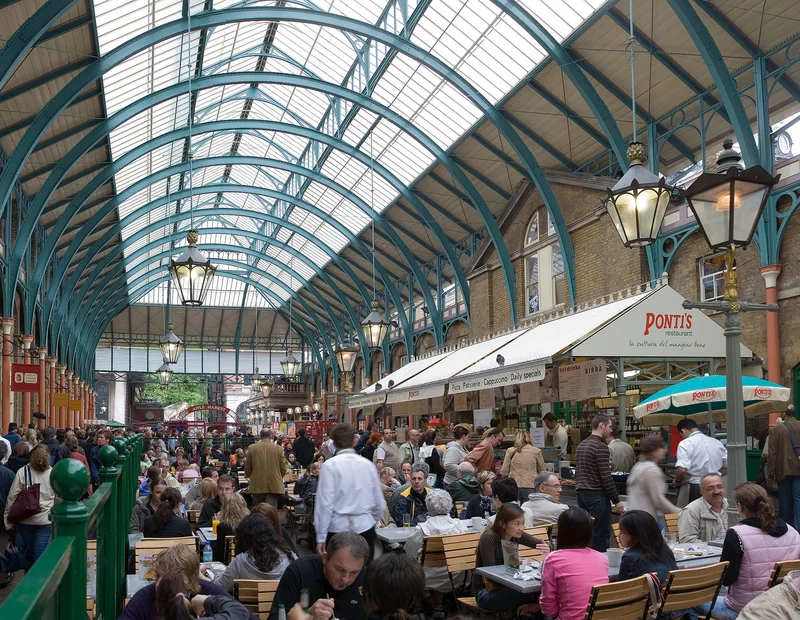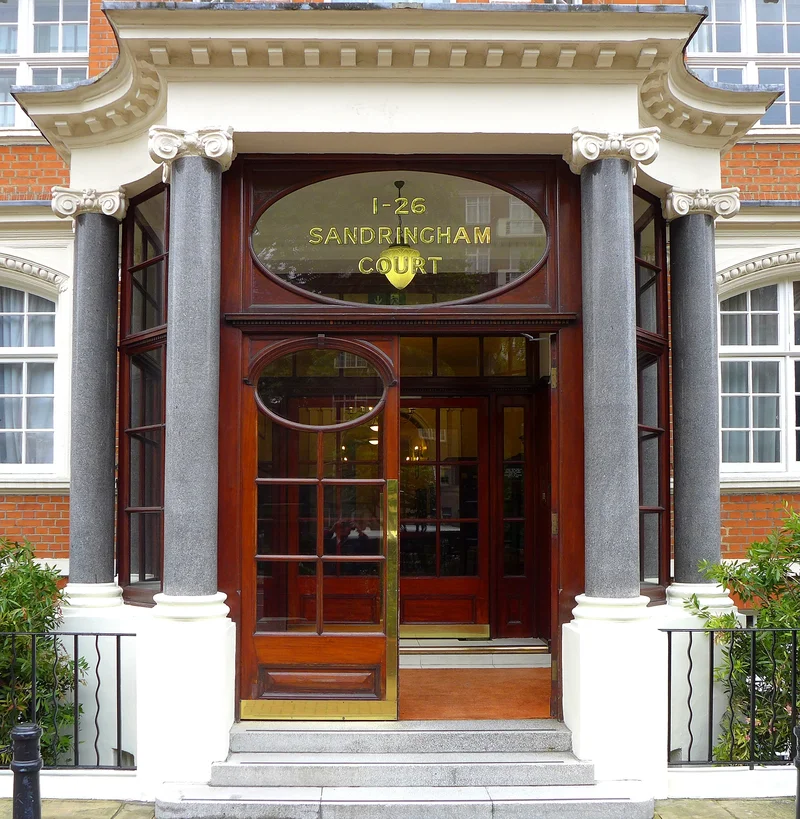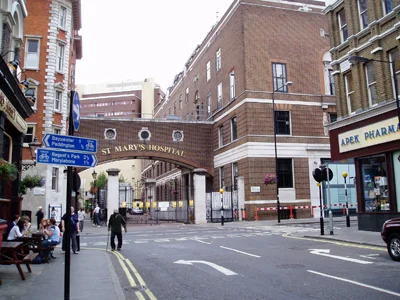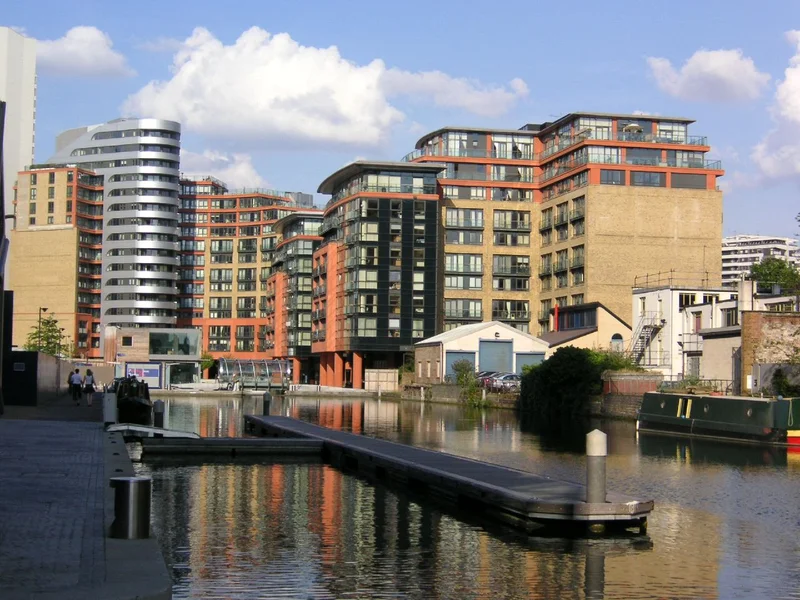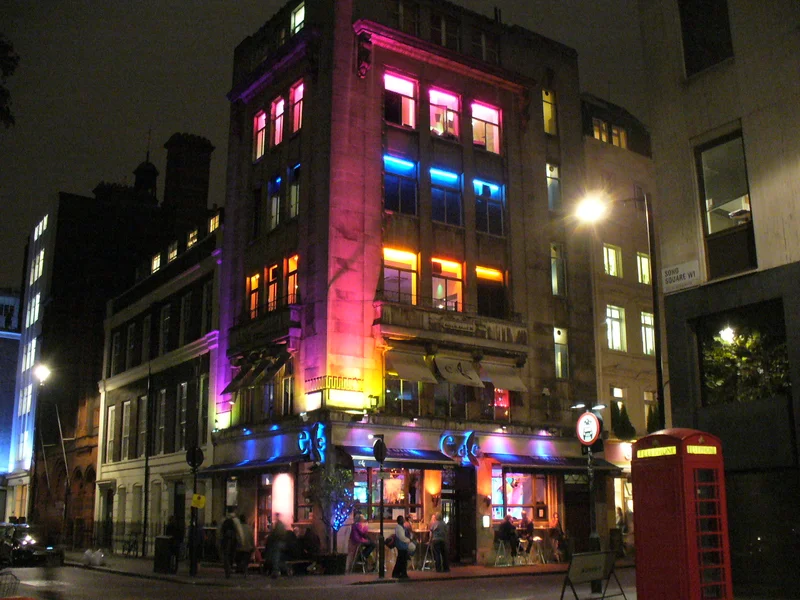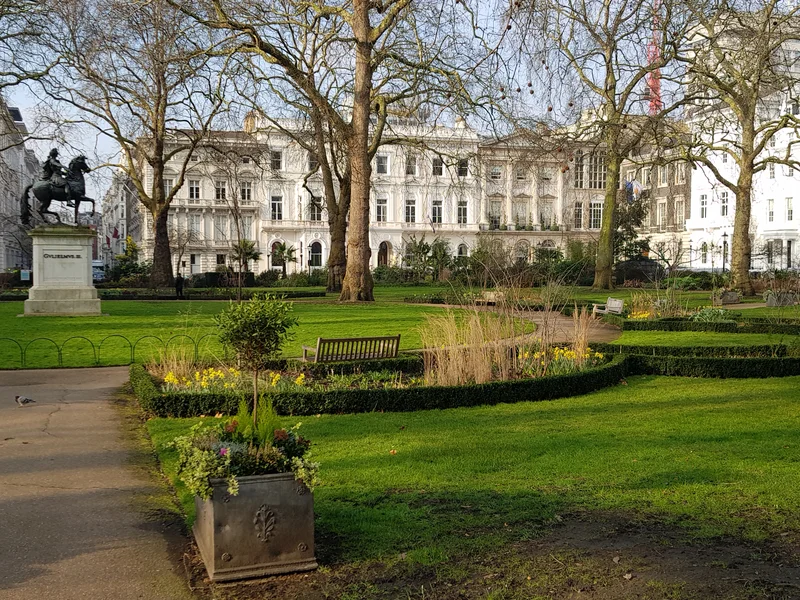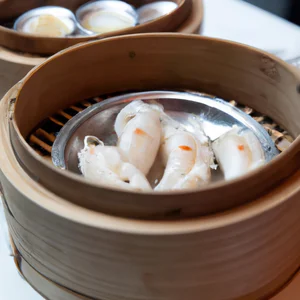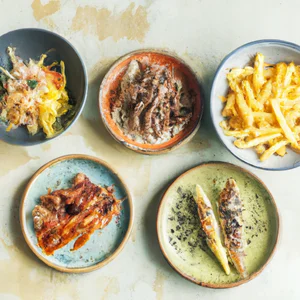Book your experience
Middle Eastern cuisine in London: Lebanese and Turkish restaurants to try
Hi everyone! So, let’s talk a bit about Middle Eastern cuisine in London, eh? It is a true paradise for those who love strong flavors and spices. If you are in the area, you absolutely cannot miss some Lebanese or Turkish restaurants.
So, I once went to this Lebanese restaurant, which was called “Aladdin’s Cave” or something like that. I tell you, the dishes were so good it felt like traveling straight to Beirut! Creamy hummus, warm pita, and a tabbouleh that was poetry to the palate. And then, the falafel… oh, my! They were crunchy on the outside and soft on the inside, like a treat for your stomach.
And then there are the Turks, who don’t joke at all. I tried a kebab in a little place that looked like a hole in a wall, but I swear, it was the best kebab of my life. The meat was so tasty I thought I was lost in an Istanbul bazaar. What about Turkish tea? A true nectar of the gods, which makes you forget all your problems, at least for a moment.
In short, if you are in London, a trip to one of these restaurants is a must. It may not be like eating at grandma’s house, but I assure you that you will take home a lot of good memories and a little spice in your heart. And who knows, maybe we even get a nice dessert, like baklava, which is like a sweet hug at the end of a meal.
I don’t know about you, but I think every bite of these Middle Eastern delights is a journey in itself. So, what do you think? Ready to explore?
The best Lebanese restaurants in London not to be missed
A meeting between flavors and cultures
I vividly remember my first experience at a Lebanese restaurant in London: the air was permeated with the scent of aromatic spices, while the tables were adorned with dishes rich in bright colours. Sitting at a laid table, I savored the tabouleh, fresh and fragrant, while traditional Lebanese music resonated in the background, creating a magical atmosphere. If you also want a similar experience, London offers a selection of Lebanese restaurants that promise an unforgettable culinary journey.
Restaurants to try
Marianne - Located in the heart of Notting Hill, this family-run restaurant is famous for its mezze, a selection of starters including hummus, baba ghanoush and fried falafel. Each dish is prepared with fresh, high-quality ingredients, making every bite an explosion of flavor.
Dishoom - Although it is mainly known for its Indian cuisine, its Lebanese brunch is not to be missed. The shakshuka with poached eggs and spicy tomato sauce is an experience worth savouring.
Al Waha - An authentic corner in Camden, Al Waha is famous for its grill and traditional dishes, such as kebbeh and shawarma. The atmosphere is welcoming and informal, perfect for a relaxing evening with friends.
An insider tip
If you want to taste the authenticity of Lebanese cuisine, try visiting London’s Arab markets, such as Edgware Road Market. Here, you can not only find fresh ingredients and spices, but also taste dishes prepared by local vendors, which are often more authentic and less touristy.
A dive into history
Lebanese cuisine has ancient roots, dating back millennia, and reflects the influence of several Mediterranean cultures. The tradition of mezze, for example, is a symbol of conviviality and sharing, typical of Lebanese culture, where food is not just nourishment, but a way to bring people together.
Sustainability and responsibility
Some of these restaurants adopt sustainable practices, such as using organic ingredients and supporting local suppliers. Choosing to eat in these places not only delights the palate, but also contributes to responsible tourism.
An experience not to be missed
For an authentic Lebanese experience, take a cooking class at The Lebanese Cookery School in London. Here, you will have the opportunity to learn to prepare traditional dishes under the guidance of expert chefs, bringing home not only recipes, but also culinary stories and traditions.
Myths and misconceptions
A common misconception is that Lebanese cuisine is solely meat-based. In fact, it also offers a wide range of vegetarian dishes, rich in flavor and nutrients, which often surprise even the most demanding palates.
A final reflection
Next time you are in London, ask yourself: How can Lebanese cuisine enrich my travel experience? Discovering the flavors of this corner of the world will allow you to look beyond the plate, embracing a culture rich in history and tradition. It’s not just a meal, it’s a journey through time and space.
Discovering Turkish flavors: a culinary journey
A journey through flavors
I still remember the first time I tasted an authentic Turkish kebab in a small restaurant in the heart of London. The scent of spices enveloped the air, while the sound of meat sizzling on the grill created a magical atmosphere. Each bite was an explosion of flavors: the perfect mix of succulent meat, yogurt sauce and warm pita bread. This fortuitous meeting marked the beginning of my passion for Turkish cuisine, a rich and varied gastronomic tradition, which reflects the history and culture of a nation.
The best Turkish restaurants in London
When it comes to Turkish restaurants in London, some names shine for their authenticity and quality. Among these, Mangal 2 in Dalston is famous for its kebabs and warm welcome. Another place not to be missed is Çiya Sofrası, which offers traditional dishes of Anatolian cuisine, made with fresh ingredients and recipes handed down from generation to generation. For a more refined experience, Hüseyin in Islington offers a menu that celebrates contemporary Turkish cuisine without losing sight of its roots.
An insider tip
If you want a truly authentic dining experience, look for restaurants that offer meze, a selection of small plates for sharing. This not only allows you to enjoy a variety of flavors, but is also a way to immerse yourself in the Turkish tradition of conviviality. Also, don’t forget to try çay, Turkish tea served in elegant tulip-shaped glasses: it’s a ritual you can’t miss!
The cultural impact of Turkish cuisine
Turkish cuisine is a reflection of its thousand-year history, influenced by different empires and cultures. From Ottoman recipes to more modern ones, each dish tells a story of tradition and innovation. Turkish dishes, often prepared with fresh, local ingredients, not only satisfy the palate, but also offer a glimpse into the country’s cultural diversity.
Sustainability in the kitchen
Many Turkish restaurants in London are embracing sustainability practices, using locally sourced ingredients and adopting eco-friendly cooking methods. This not only helps the environment, but also ensures that the dishes are fresh and tasty.
An unmissable experience
For an unforgettable experience, take a Turkish cooking class. Many local chefs offer classes where you can learn to prepare traditional dishes like kebap or baklava, while they tell you anecdotes about Turkish food culture. It’s a fantastic way to deepen your knowledge of cooking and bring a piece of Turkey home.
Myths to dispel
A common misconception is that Turkish cuisine is limited only to kebabs. In reality, it is extremely varied and includes a wide range of dishes, from soups to salads, from desserts to vegetarian specialties. Discovering this richness is part of the fun!
A final reflection
Turkish cuisine, with its vibrant flavors and fascinating traditions, has the power to bring people together. We invite you to consider: What is the Turkish dish you haven’t tried yet and what might surprise you? Next time you are in London, follow your senses and let yourself be guided by the scents and colors of this extraordinary cuisine.
Ancient traditions: falafel and its history
An unforgettable encounter with falafel
The first time I tasted falafel, I was in a small kiosk in the heart of Beirut, surrounded by the scent of spices and the lively sound of the market. Every bite of those crunchy chickpea balls, wrapped in warm pita and enriched with tahini sauce and fresh vegetables, transported me on a culinary journey I would never forget. From that moment, I understood that falafel is not just a dish, but a symbol of conviviality and Middle Eastern culture.
The history of falafel
The origins of falafel are shrouded in mystery, with legends attributing it to different regions of the Middle East. Although many believe it originated in Egypt, it has become an iconic food throughout the Arab world and beyond. This legume-based snack is a response to the need for nutritious and accessible food, perfect for travelers and workers. Today, falafel represents not just a dish, but a journey through the traditions and cultures of an entire region.
A tip for connoisseurs
A tip that few know is to look for falafel prepared with fresh, local ingredients. For example, some restaurants in London, such as Hummus Bros, offer falafel variations made with fresh peas, adding a unique flavor and surprising texture. Plus, many of these places use fresh herbs, like parsley and mint, to further enhance the flavor.
The cultural impact of falafel
Falafel has deep cultural significance; it is often seen as a street food that brings people together. In families, the preparation of falafel becomes a ritual, a moment of sharing and celebration, where each member contributes. This dish is, therefore, a reflection of the culture of conviviality, a fundamental value in Middle Eastern traditions.
Sustainability and falafel
Choosing to eat falafel can also be a sustainable choice. Many restaurants and food stalls in London are committed to using organic and local ingredients, reducing their carbon footprint. Opting for falafel is not only a pleasure for the palate, but can also support responsible tourism practices.
Immerse yourself in the atmosphere
Imagine sitting on a wooden bench, with a steaming pita in hand, while watching life go by around you. The vibrant colors of the market, the scent of spices and the sound of laughter create an atmosphere that makes you feel part of something bigger. This is the power of falafel: it invites you to discover ancient stories and connect with different cultures.
An activity worth trying
For an authentic experience, I recommend attending a Lebanese cooking workshop, where you can learn how to make falafel from scratch. This activity will not only teach you culinary techniques, but will also allow you to understand the stories and traditions surrounding this dish.
Myths to dispel
A common misconception is that falafel is just a street food or vegan option. In fact, it is a versatile dish that can be enjoyed in various ways: as a starter, main course or even in salads. Its richness of flavors and its adaptability make it an option loved by all.
Final reflections
As you savor a delicious falafel, I invite you to reflect on how a simple dish can encapsulate stories of cultures, traditions and communities. What’s your favorite dish that tells a story? Discovering falafel will lead you not only to enjoy a flavor, but also to live an experience that goes beyond simply eating.
An authentic experience: cooking with local chefs
I still remember the first time I attended a cooking class in Beirut, where a skilled local chef guided me in preparing an authentic tabbouleh. As I chopped fresh parsley and stirred bulgur, I felt the energy of the kitchen blending with the stories of its past. That class was not only an opportunity to learn, but also a journey into the heart of Lebanese culture. Now, in London, this dining experience is easily replicable, and there’s no better way to immerse yourself in Lebanon’s rich gastronomic tradition than cooking with local chefs.
What to expect from a Lebanese cooking class in London
Several cooking schools and restaurants offer hands-on courses in London, where you can learn the secrets of Middle Eastern cuisine. Places like The Lebanese Bakery or Cookery School in Bloomsbury offer sessions ranging from making meze to main dishes like shawarma and kebab. These experiences will not only allow you to hone your cooking skills, but also connect with other cooking enthusiasts.
An insider tip
Here’s a little-known tip: Try taking a cooking class that includes a visit to the local market. This will give you the opportunity to choose fresh, high-quality ingredients, a key aspect of Lebanese cuisine. Many local chefs are happy to share their favorite markets with you, where you can discover spices and fresh produce you wouldn’t find elsewhere.
The cultural impact of cuisine
The cuisine is a reflection of Lebanese culture, a crossroads of Arab, Turkish and French influences. Each dish tells a story of hospitality, tradition and community. Learning to cook together with an expert not only serves to transmit culinary techniques, but also to understand the importance of food as an element of social and cultural union.
Sustainable tourism practices
Many cooking classes in London are committed to using local and organic ingredients, contributing to more sustainable and responsible cooking. Opting for courses that promote eco-friendly practices not only helps the environment, but also supports the local economy.
An activity not to be missed
After learning the basics of Lebanese cuisine, why not host a dinner with friends to show off your new skills? Create a menu of dishes you have learned and invite your loved ones to discover the flavors of Lebanon directly from your kitchen.
Myths and misconceptions
A common misconception is that Lebanese cuisine is just a mix of meat-based dishes. In fact, Lebanese cuisine is incredibly diverse and includes many vegetarian and vegan options, making it accessible to everyone. Deepening your knowledge of these traditions can truly broaden your culinary experience.
Final reflection
Cooking with local chefs offers a unique opportunity to explore not only the flavors, but also the soul of Lebanese culture. Have you ever wondered how food can bring people together and tell stories? The next time you sit down at the table, consider all the work and passion that goes into each dish. And you, are you ready to get cooking?
Sustainability in the kitchen: eco-friendly restaurants
A personal journey into sustainability
I vividly remember my first visit to an eco-friendly restaurant in London: the enveloping scents of fresh spices mixed with the aroma of freshly baked bread, while the bright colors of local vegetables adorned the dishes. That restaurant not only served delicious food, but every detail, from the recycled decor to the use of organic ingredients, spoke of a deep commitment to sustainability. The experience opened my eyes to how cooking can be a vehicle for ecological change.
Practical information on eco-friendly restaurants
London offers a variety of restaurants that put sustainability first. Among the best known, Manna and The Good Life Eatery are two excellent choices. Manna, located in Primrose Hill, is a vegetarian restaurant that uses organic and locally sourced ingredients. The Good Life Eatery, with several locations in the city, offers healthy and nutritious dishes, many of which are vegan or gluten-free. It’s a good idea to always check their menus online, as they tend to change based on the seasonality of the ingredients.
An insider tip
A little-known tip is to try weekend food markets, like Borough Market or Brick Lane Market. Here, many vendors offer sustainable options and can share fascinating stories about their sourcing methods. Don’t forget to ask about the ingredients and their origin: many sellers are keen to talk about how they work with local producers.
The cultural impact of sustainability
The growing focus on sustainability in London’s restaurant scene isn’t just a trend; it is a reflection of a broader cultural shift. The food community is responding to a growing awareness of the environmental impact of our food choices. Eco-friendly restaurants not only serve delicious dishes, but also serve as catalysts for a broader conversation about environmental responsibility.
Responsible tourism practices
When you choose to eat in eco-friendly restaurants, you actively contribute to a more sustainable economy. Many of these restaurants partner with local farms to reduce the impact of transporting ingredients and often use greener waste disposal practices. Participating in dining experiences that promote sustainability is a great way to travel responsibly.
An activity not to be missed
If you’re craving an unforgettable culinary experience, I recommend signing up for a sustainable cooking workshop, like those organized by The Jamie Oliver Cookery School. Here, you can learn to prepare delicious dishes using fresh, sustainable ingredients, while learning about responsible cooking practices.
Myths to dispel
A common misconception is that eco-friendly restaurants don’t offer tasty food or that they are too expensive. In fact, many of these restaurants feature creative and flavorful menus at affordable prices. Additionally, using fresh, local ingredients often results in a richer, more authentic flavor.
Final reflection
Next time you’re in London, consider exploring the sustainable side of the food scene. You might be surprised at how delicious responsible food can be. What are your experiences with sustainable cooking? Are you ready to discover new flavors while contributing to a greener future?
From half moon to tea: iconic Middle Eastern drinks
A sensorial journey through flavors
I still remember my first encounter with mint tea in a small cafe in Beirut. The fresh, enveloping aroma mixed with the warmth of conversation and the sound of laughter. Every sip was an invitation to discover not just a drink, but an entire culture. This experience is just one of many that can be had when exploring the rich tradition of Middle Eastern beverages.
Drinks that tell stories
The drinks landscape in the Middle East is as diverse as it is fascinating. From lben (a type of fresh yogurt) to mint tea, to Arabic coffee served with a touch of cardamom, every sip is full of meaning. The traditions of preparation and consumption of these drinks are rooted in the history and culture of different nations. For example, Arabic coffee, often elaborately brewed and served in small cups, symbolizes hospitality and social connection.
An insider tip
If you want to fully immerse yourself in tea culture, look for a local diwan, a kind of traditional parlor. Here, you may find a cozy corner where residents gather to enjoy tea and exchange stories. A little-known tip: ask to try the tea with a pinch of za’atar (a herbal blend), a touch that can transform a simple tea into an unforgettable experience.
Culture and sustainability
Beverage preparation and consumption in the Middle East not only reflects local culture, but can also be sustainable practices. Many local markets offer fresh, organic ingredients, reducing your environmental impact. Choosing to drink loose tea instead of packaged tea is a great way to support local producers and contribute to sustainability.
An engaging atmosphere
Imagine sitting on a colorful carpet, surrounded by candles that softly illuminate the room while a waiter serves you a steaming tea. The warmth of conversations around you, the scent of spices pervading the air, everything contributes to creating a magical atmosphere. It’s an experience that makes you feel part of something bigger.
An experience worth trying
Don’t miss the chance to visit a local market where you can observe the preparation of traditional drinks. You could also participate in a cooking workshop that includes tea and coffee making, an excellent way to bring a piece of this culture home.
Myths and reality
One of the common myths is that Middle Eastern drinks are overly sweet. In fact, many of them, like mint tea, can be enjoyed without sugar, enhancing the fresh, aromatic flavors of the herbs. Discovering these details can greatly enrich your dining experience.
A final reflection
Each sip of tea or coffee invites you to consider not only the flavor, but also the stories and traditions that accompany it. The next time you find yourself in front of a cup of tea, ask yourself: what story is hidden behind this drink?
Lebanese street food: where to find the best delicacies
A journey through the flavors of Beirut
I still remember the first time I found myself in Camden Market, surrounded by a whirlwind of smells and sounds that seemed to tell stories of distant lands. It was here that I savored a chicken shawarma that awakened my senses. The tender meat, wrapped in a warm pita and filled with fresh vegetables and aromatic sauces, was a true embrace of flavors. This moment made me understand how Lebanese street food is not just a quick meal, but a cultural experience to live.
The best places for Lebanese street food in London
If you’re looking for authentic Lebanese delicacies, London doesn’t disappoint. Among the best places to visit I recommend:
- The Lebanese Bakery: Located in Battersea, it is famous for its manakish, a sort of Lebanese pizza with cheese, za’atar and other delights.
- Hummus Bros: With multiple locations, this place is a hummus lover’s paradise. Try their version with grilled chicken and toasted pine nuts.
- Maroush: An institution on Edgware Road, here you can enjoy a crispy falafel accompanied by a tahini sauce that will leave you speechless.
An insider tip
While the restaurants are great, don’t forget to explore the markets. You may discover small stalls offering unique dishes, such as kebbe, a freshly prepared meat and bulgur specialty. These lesser-known places offer an authentic experience and, often, more affordable prices.
A cultural evolution
Lebanese street food is not just street food; it is a reflection of Lebanon’s culture and history. Traditionally, Lebanese gathered in markets to share meals and conversations, creating a social bond that persists today. This isn’t just a meal; it is a moment of conviviality and sharing.
Sustainability and responsibility
When exploring street food, try to support local vendors who use fresh, sustainable ingredients. Many of them are committed to reducing waste and using biodegradable packaging. Choosing to eat at these places not only enriches your dining experience, but also supports small businesses.
An experience not to be missed
Don’t miss the opportunity to participate in a food tour dedicated to street food. Several organizations offer tours that will guide you through the best corners of the city to taste Lebanese specialties. A perfect way to broaden your knowledge and palate!
Myths and reality
A common misconception is that street food is unhygienic. In fact, many vendors take pride in the quality and freshness of their ingredients, and the stalls are often cleaner than you might think. Don’t be intimidated!
Final reflections
Next time you’re in London, ask yourself: What’s my favorite Lebanese food? You may find that a journey through Lebanese street food is not just a way to satisfy your appetite, but also a opportunity to immerse yourself in the vibrant culture of this wonderful city.
The spices of the Middle East: a laboratory of taste
A journey through aromas and flavors
I still remember the first time I set foot in a Lebanese restaurant in London. The atmosphere was vibrant, the scent of spices mixed with traditional music, creating a harmony that seemed to transport me to a Beirut bazaar. Each dish was a discovery, a celebration of flavors and traditions. Middle Eastern spices are not just ingredients; they are stories, cultures and passions contained in a single bite.
Spices: the soul of Middle Eastern cuisine
Spices, such as cumin, paprika and sumac, are the beating heart of Lebanese and Turkish cuisine. These ingredients not only give life to the dishes, but also tell the story of the past of a people and its evolution. For example, sumac, a red and acidic berry, is used to give freshness to salads and to flavor meats, making every bite an explosive experience.
From the Dishoom restaurant to Marianne, each venue offers its own interpretation of spices, creating a taste laboratory that stimulates the senses. Be sure to try the kebap at the Skewd restaurant, where marinating meats with herbs and spices is a real ritual.
Insider Tip: The Secret to the Spice Mix
One of the best kept secrets of Lebanese restaurateurs is baharat, a mix of spices that varies from region to region. Often, restaurateurs create their own secret blends, making each dish unique. If you have the opportunity to talk to the chef, ask to share their baharat recipe – he might surprise you with unexpected ingredients like cardamom or cloves.
Cultural impact and sustainable practices
Middle Eastern cuisine is deeply rooted in conviviality and sharing, reflecting the culture of the Middle East. London restaurants, increasingly attentive to sustainability, use fresh and local ingredients. Many of them, like Taza, are committed to reducing food waste, combining tradition and environmental responsibility.
An experience not to be missed
For an authentic experience, take part in a Lebanese cooking workshop, where you can learn to prepare typical dishes such as tabouleh or hummus. These courses will not only teach you techniques, but will also allow you to learn about the importance of spices and how to use them to enhance your dishes.
Myths to dispel
A common misconception is that Middle Eastern cuisine is only spicy. In reality, spices are used to balance flavors and enrich dishes, not just to add heat. Each dish tells a story of balance and harmony.
Final reflection
As you venture into London’s food scene, ask yourself: how can spices transform your perception of food and culture? The next time you enjoy a Middle Eastern dish, remember that every aroma has its own story to tell, and every bite is a step towards a deeper connection with the world around you.
An unusual tip: join a shared dinner
When I think of Middle Eastern cuisine in London, my heart fills with memories, but one in particular stands out: my first shared dinner. Imagine entering a welcoming restaurant, where the scent of spices envelops the air and the laughter of the diners creates a warm and lively atmosphere. This experience not only allowed me to enjoy authentic Lebanese and Turkish dishes, but also made me feel part of a community.
The shared dinner experience
Shared dinners, or “mijadara”, are a traditional custom that encourages conviviality and bonding between people. In many Lebanese restaurants in London, such as the well-known “Maroush”, you can find evenings dedicated to this type of experience. Here, dishes are served on large trays, inviting everyone to help themselves and share. It’s a wonderful way to try a variety of dishes, like kibbeh or grilled meats, and to discover new flavors through chatter and laughter with your dining companions.
An insider tip
Here’s a little-known tip: don’t be afraid to ask your neighbor to share their dish! This practice not only enriches your dining experience, but also creates a bond with other people who, like you, are there to enjoy Middle Eastern cuisine. Many restaurants encourage this swap, and who knows, you might even discover a dish you never thought you’d try!
Culture and history of shared dinner
Shared dinners are rooted in Middle Eastern culture, where food is more than just a meal; it is a time of socialization and celebration. In many Middle Eastern cultures, food is prepared with love and care, and sharing meals is a way to honor guests and create lasting memories.
Sustainability and responsible tourism
Furthermore, participating in shared dinners can have a positive impact on the local community. Many restaurants offering this type of experience are committed to sustainable practices, using fresh, locally sourced ingredients. Choosing to eat in these places is not only a good deal for your palate, but also for the planet.
An invitation to try
If you’re in London and want a dining experience that goes beyond just a meal, I highly recommend joining a shared dinner. Not only will you enjoy a variety of delicious dishes, but you will also have the opportunity to meet new people and immerse yourself in Middle Eastern culture.
In conclusion, how about trying a shared dinner next time you’re at a Lebanese or Turkish restaurant? It’s a unique way to experience Middle Eastern cuisine and, who knows, it might even lead you to discover a new favorite dish!
The culture of conviviality: eating like a local
A personal, heart-warming experience
I vividly remember my first dinner in Beirut, in a small restaurant hidden among the crowded streets. The place was surrounded by a warm and welcoming atmosphere, where the scent of tabbouleh and hummus danced in the air. The table was set with colorful dishes, and guests were invited to share not only food, but also stories and laughter. That evening, I understood that eating in Lebanon is much more than just a meal: it is a ritual of connection and conviviality.
Eating like a local: practical information
In London, the culture of conviviality is reflected in restaurants like Marianne and The Lebanese Diner, where the concept of sharing plates is fundamental. Here, dishes such as kebab and moutabal are served in generous portions, inviting diners to enjoy together. Another experience not to be missed is to participate in a shared dinner, where groups of strangers come together to savor a fixed menu prepared with fresh, seasonal ingredients.
An insider tip
If you want an authentic convivial experience, look for supper club events that take place in private homes. These events are often organized by local chefs and offer the opportunity to savor traditional dishes, while chatting with other diners in an informal and familiar environment. An example is The Real Taste of Lebanon, where you can discover recipes passed down from generation to generation.
The cultural impact of conviviality
Conviviality around food is a central aspect of Lebanese culture, rooted in traditions that date back centuries. Families gather around the table to celebrate special occasions, but also for simple everyday meals. This is not just a way to feed ourselves, but a way to strengthen bonds and create collective memory.
Sustainability and responsibility
Many restaurants in London are adopting sustainable practices, using local and organic ingredients. Choosing restaurants that support sustainability not only enriches your dining experience, but also helps preserve culinary traditions. For example, the Ouzeria restaurant uses local suppliers to ensure freshness and quality.
Soak up the atmosphere
Imagine sitting at a long table, surrounded by colorful dishes and traditional decorations. You can hear the chatter of other diners, the clink of cutlery and the enveloping scent of spices. Every bite tells a story, every laugh is an invitation to continue the evening.
An activity worth trying
For an authentic experience, consider attending a Lebanese cooking workshop. Many of these courses are taught by local chefs and will allow you to learn to prepare typical dishes such as kebab and sweet baklava, while sharing stories and recipes with other cooking enthusiasts.
Myths and misconceptions
A common misconception is that Lebanese cuisine is only mezze and vegetarian dishes. In fact, Lebanese gastronomy is full of meat, fish and savory options that reflect the diversity of the country’s culinary traditions. Don’t be fooled: every meal is an opportunity to explore a wide range of flavors.
A final reflection
Conviviality is an essential part of Lebanese culture, and by immersing yourself in this tradition in London, you will not only enjoy delicious food, but you will also discover a way of life that celebrates community and human relationships. The next time you sit at the table, ask yourself: how can you make your meal a moment of sharing and connecting with others?

 Architecture and Design
Architecture and Design Cities and Regions
Cities and Regions Culture and History
Culture and History Events and Festivals
Events and Festivals Fashion and Shopping
Fashion and Shopping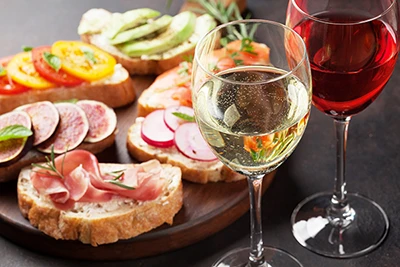 Food and Wine
Food and Wine Nature and Adventure
Nature and Adventure Unique Experiences
Unique Experiences